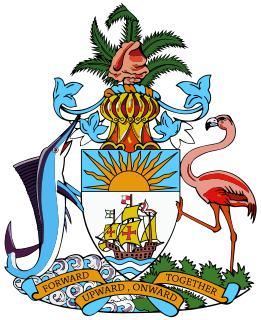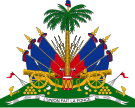
Elections in the Bahamas take place in the framework of a parliamentary democracy. Since independence voter turnout has been generally high in national elections, with a low of 87.9% in 1987 and a high of 98.5% in 1997. The current Prime Minister is the Hon Hubert Minnis.

General elections were held in Haiti in 1995. The presidential election, held on 17 December, resulted in a victory for René Préval of Fanmi Lavalas. The parliamentary elections, held on 25 June, 13 August and 17 September, were also won by Lavalas. Voter turnout was just 31.09% for the parliamentary elections and 27.8% for the presidential elections.

General elections were held in Haiti between 16 December 1990 and 20 January 1991. The presidential election, held on 16 December, resulted in a victory for Jean-Bertrand Aristide of the National Front for Change and Democracy (FCND), whilst the FCND also won the parliamentary elections in which voter turnout was 50.8%. It was widely reckoned as the first honest election held in Haiti since the country gained independence in 1804.

Parliamentary elections in 2000 were held in Haiti in two separate sets of elections, on May 21, 2000 and July 9, 2000, for all 83 seats in the Chamber of Deputies and nineteen seats in the Senate, and later that year, at the same time as November 26, 2000 presidential election for eight Senate seats. The legislative elections and presidential elections in the fall ran largely smoothly, however the first and second rounds of the spring elections generated the most controversy.

Parliamentary elections were held in Russia on 12 December 1993. They included the last elections to the Federation Council of Russia.
Parliamentary elections were held in North Korea on 25 November 1967. Only one candidate was presented in each constituency, all of which were selected by the Workers' Party of Korea, although some ran under the banner of other parties or state organisations to give an appearance of democracy. Voter turnout was reported to be 100%, with 100% voting in favour of the candidates presented.

General elections were held in Haiti on 22 September 1957. Former Minister of Labour François Duvalier won the presidential election running under the National Unity Party banner, defeating Louis Déjoie, as well as independent moderate Clement Jumelle, who had dropped out on election day in a cloud of suspicions that the army was monitoring the election in favour of Duvalier. Former head of state Daniel Fignolé, considered a champion of poor blacks, was considered ineligible as he had been forcibly exiled months before the election, allegedly kidnapped.

Presidential elections were held in Haiti on 26 November 2000. The opposition parties, organised into the recently created Convergence Démocratique, boycotted the election after disputing the results of the parliamentary elections. The result was a landslide victory for Jean-Bertrand Aristide, who received 91.7% of the vote with a turnout of around 50%.

General elections were held in Costa Rica on 26 July 1953. José Figueres Ferrer of the National Liberation Party won the presidential election, whilst his party also won the parliamentary election. Voter turnout was 67.2 percent in the presidential election and 67.5 percent in the parliamentary election.

General elections were held in Costa Rica on 1 February 1970. José Figueres Ferrer of the National Liberation Party won the presidential election, whilst his party also won the parliamentary election. Voter turnout was 83.3%.

A constitutional referendum was held in Haiti on 10 and 11 January 1928. Voters were asked to approve or reject thirteen amendments to the constitution. Each amendment was voted on separately, with all approved by at least 97% of voters.

Parliamentary elections were held in Haiti on 30 April 1961. They followed the dissolution of Parliament by President François Duvalier and the abolition of the Senate, making the Chamber of Deputies a unicameral body. Duvalier's National Unity Party won all 67 seats in the elections, which were later re-interpreted as presidential elections in order to give Duvalier a six-year presidential term and avoid the need for scheduled presidential election in 1963.

Parliamentary elections were held in Haiti on 11 February 1973. Over 300 candidates contested the election, all of whom were members of the National Unity Party and supporters of President Jean-Claude Duvalier.
Parliamentary elections were held in Norway in 1873. As political parties were not officially established until 1884, all those elected were independents. Voter turnout was 45.6%, although only 4.6% of the country's population was eligible to vote.

Parliamentary elections were held in Portugal on 16 December 1934, the first following the establishment of the one-party state known as the Estado Novo. The National Union was the only party to contest the elections, and no opposition candidates were allowed to run. It subsequently won all seats in the National Assembly, three of which were taken by women.

Parliamentary elections were held in Portugal on 30 October 1938. The country was a one-party state at the time and the National Union was the only party to contest the elections, with no opposition candidates allowed to run.

Parliamentary elections were held in Portugal on 1 November 1942. The country was a one-party state at the time and the National Union was the only party to contest the elections, with no opposition candidates allowed to run.

Parliamentary elections were held in Haiti on 14 June 1964, alongside a constitutional referendum. The National Unity Party of President François Duvalier was the sole legal party at the time, with all other parties having been banned the previous year.

Parliamentary elections were held in Haiti on 22 January 1967. The National Unity Party of President-for-life François Duvalier was the sole legal party at the time, all other parties having been banned in 1963.

Parliamentary elections were held in Haiti on 9 January 1955. They were rigged by President Paul Magloire to ensure that Daniel Fignolé would not be elected to the Chamber of Deputies.









